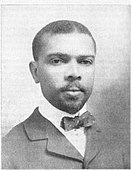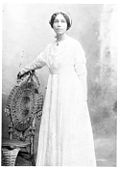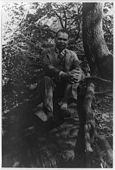Georgia Douglas Johnson
Georgia Blanche Douglas Camp Johnson , mostly called Georgia Douglas Johnson ( September 10, 1877 (according to other sources mostly 1886) in Atlanta - May 14, 1966 in Washington, DC ), was an American poet and composer . She was one of the first female African American playwrights , ran a literary salon for forty years and is part of the Harlem Renaissance group.
From 1926 to 1932 she wrote a weekly column called Homely Philosophy, which was published as a syndicated column in several newspapers.
resume
Johnson was the daughter of Laura Douglas and George Camp. There are discrepancies as to the year of birth, which range from 1877 to 1887, and as to the place of birth, Marietta or Atlanta. In individual sources, her mother's maiden name is also given as Jackson . Her mother had ancestors from the African Americans and Native Americans , her father was descended from African Americans and English immigrants. This explains their relatively light skin color.
She spent most of her childhood in Rome , Georgia. She went to school there and in Atlanta and excelled in reading, recitation and sports. In self-study she taught herself to play the violin , which led to a lifelong enthusiasm for music and later had her write chants as well as shaping the musical part of her plays. Johnson graduated in 1896 Normal School of Atlanta University and taught thereafter in Marietta. She stopped teaching in 1902 to study music at the Oberlin Conservatory of Music in Ohio, but then returned to Atlanta as the assistant director of a public school.
On September 28, 1903, she married Henry Lincoln Johnson, an Atlanta attorney and member of the Republican Party . The couple had two sons: Henry Lincoln Johnson, Jr., and Peter Douglas Johnson (died 1957). In 1910, Johnson's husband became the archivist of the United States President Taft William Howard appointed, and the family moved to Washington, DC Douglas Johnson said later that her husband was her literary ambitions against not very open. He would have liked to see her only around the house. Despite this, she sent her poems to various newspapers and magazines, published a first poem in The Voice of the Negro magazine in 1905 and a first volume of poetry in 1916. And although her husband criticized her literary activities, she dedicated two poems to him: The Heart of a Woman (1916) and Bronze (1922).
Her husband died in 1925 and from then on she had to look after her two sons, who were still teenagers at the time. Now she had to keep the family on a series of temporary jobs. Eventually, however, in recognition of her husband's loyalty and service to the Republican Party, she was appointed Commissioner of Conciliation at the Department of Labor by President Calvin Coolidge . She spent the rest of her life in the capital Washington.
plant
During her time in Washington, she began to write more poems and short stories. She cited a poem by William Stanley Braithwaite in which a child tends to a rose as the source of her inspiration . She also began writing lyrics and plays, teaching music, and playing the organ in her parish .
Poetry
Douglas Johnson published a total of four volumes of poetry. The first was called The Heart of a Woman (1916). Her poems are generally described as "feminine" or "ladylike", they have generic titles such as Faith , Youth and Joy . A number of her poems appeared in The Crisis magazine , edited by the National Association for the Advancement of Colored People and sponsored by WEB Du Bois . The lyric piece Calling Dreams was published in the January 1920 edition, Treasure in July 1922 and To Your Eyes in November 1924.
Dramas
Johnson wrote 28 plays. The drama Plumes was published under the stage name John Temple . A number of her theater texts were never printed because of their race and gender. Akasha Gloria Hull finally rediscovered some of her pieces . Her dramas can be divided into four categories: "Primitive Life Plays", "Plays of Average Negro Life", "Lynching Plays" and "Radio Plays". In 1926 Douglas Johnson received an honorable mention at the Opportunity Drama Contest for her one-act play Blue Blood . With the play Plumes she won this competition in 1927. Douglas Johnson was one of the few women whose theater texts were published in Alain Locke's anthology Plays of Negro Life: A Source Book of Native American Drama . Some of her plays have been lost, and ten typescripts of her dramas have been preserved in academic institutions in the United States.
Literary salon
Soon after her husband's death in 1925, the writer began inviting friends, fellow writers, artists, and scholars to her home at 1461 S Street Northwest, Washington. The meeting of representatives of the Harlem Renaissance on Saturday evening quickly established itself as one of the most famous literary salons, called Saturday Salon or S Street Salon . The institution should have existed for over forty years. Prominent African-American writers regularly presented their latest work there and put them up for discussion in a friendly atmosphere.
The building, constructed in the Italianate style in 1880 , is located in the Logan Circle district in the northwest of the federal capital Washington and was listed as a Significant Property on the National Register of Historic Places in 1998. In 2013 it was part of the federal capital's African American Heritage Trail .
Georgia Douglas Johnson ironically called her house a halfway house , which is what the United States calls prison rehabilitation facilities. The hostess was famous for offering those who had neither money nor accommodation a place to sleep and for creating an atmosphere in her salon in which "one could openly and freely discuss political and personal matters".
Well-known guests of the S Street Salon were among others:
- Lewis Grandison Alexander (1900–1945), writer, actor and costume designer
- Gwendolyn Bennett (1902–1981), writer
- Marita Bonner (1899–1971), writer
- Countee Cullen (1903-1946), writer
- Clarissa Scott Delaney (1901–1927), teacher, social worker, and writer
- Jessie Redmon Fauset (1882–1961), writer and editor
- Angelina Weld Grimké (1880–1958), teacher, journalist and writer, a close friend of the hostess
- Langston Hughes (1902–1967), writer and social activist, author of poem I, Too, Sing America
- Zora Neale Hurston (1891–1960), folklorist and writer
- Alain Locke (1886–1954), philosopher, university professor and editor of several anthologies on the Harlem Renaissance
- Kelly Miller (1863–1939), mathematician, sociologist and essayist
- May Miller (1899–1995), writer
- Richard Bruce Nugent (1906–1987), painter, writer and actor
- Esther Popel (1896–1958), teacher, editor and writer
- Willis Richardson (1889–1977), playwright
- Anne Spencer (1882–1975), writer and activist
- Eulalie Spence (1894–1981), teacher, playwright, director and actress
- Jean Toomer (1894–1967), writer
- Edward Christopher Williams (1871–1929), librarian and writer
New Negro Movement
The New Negro Movement , as the group of the Harlem Renaissance was largely called at that time, saw education , knowledge and self-assertion as basic requirements for emancipation and equality of the Afro-American population group, but also discussed questions of discrimination , religion and family structure , but above all those Poverty issue .
The sexual orientation of numerous representatives of the Harlem Renaissance, the gay and lesbian networks that were established in the S Street Salon , as well as their literary and political consequences , have hardly been described and largely suppressed . The bisexuality of Alice Dunbar-Nelson and the lesbian orientation of Angelina Weld Grimké is well documented and described, including by Akasha Gloria Hull , but how strongly the Black Feminist Movement relies on the same-sex tendencies of its early protagonists Jessie Redmon Fauset and Zora Neale Hurston , Georgia Douglas Johnson, is still undiscovered.
Among the movement's male protagonists and guests at Douglas Johnson's Literary Salon were predominantly gays and bisexuals - Alain Locke , Countee Cullen , Langston Hughes , Claude McKay , Wallace Thurman , Richard Bruce Nugent , and also the movement's white patron, Carl Van Vechten .
Honor
In September 2009, Georgia Douglas Johnson's induction into the Georgia Writers Hall of Fame was announced.
Significant works
|
Poems
|
Plays
|
Editions of works (selection)
- The selected works of Georgia Douglas Johnson , ed. by Claudia Tate, University of Michigan / GK Hall, 1997, ISBN 978-0-7838-0038-7 , 448 pages.
- The Plays of Georgia Douglas Johnson , From the New Negro Renaissance to the Civil Rights Movement, ed. and with a foreword by Judith L. Stephens, Urbana and Chicago: University of Illinois Press, 2005, ISBN 978-0-252-07333-5 , 200 pages.
Anthologies and secondary literature
- Harold Bloom (Ed.): Black American Women Poets and Dramatists , New York: Chelsea House, 1996.
- Countee Cullen (Ed.): Caroling Dusk: An Anthology of Verse by Negro Poets , New York: Harper and Brothers, 1927.
- Gloria T. Hull: Color, Sex, and Poetry: Three Women Writers of the Harlem Renaissance , Bloomington: Indiana University Press, 1987.
- Ann Allen Shockley: Afro-American Women Writers 1746-1933: An Anthology and Critical Guide , New Haven: Meridian Books, 1989. ISBN 0-452-00981-2 .
- Margaret Busby (Ed.), Daughters of Africa : An International Anthology of Words and Writings by Women of African Descent from the Ancient Egyptian to the Present , London: Jonathan Cape, 1992, ISBN 978-0224035927
items
- CC O'Brien: Cosmopolitanism in Georgia Douglas Johnson's Anti-Lynching Literature . In: African American Review , Vol. 38, No. 4, (Winter 2004), pp. 571-587
- Judith Stephens: 'And Yet They Paused' and 'A Bill to Be Passed': Newly Recovered Lynching Dramas by Georgia Douglas Johnson. In: African American Review 33 (Autumn 1999), pp. 519-522.
proof
- ↑ There are different dates for the year of birth - they range from 1877 to 1880 to 1887. The latter seems very unlikely due to her college degree in 1896. Judith L. Stephens gives the year 1877 with a question mark, Claudia Tate the same year without a question mark. In the English Wikipedia the year 1880 is given.
- ↑ a b c d e ed., With an introduction by Judith L. Stephens: The Plays of Georgia Douglas Johnson: From the New Negro Renaissance to the Civil Rights Movement . University of Illinois Press, Urbana [et al. a.] 2005, ISBN 0-252-07333-9 .
- ↑ a b University of Minnesota : Women Writers and Artists of Color: Georgia Douglas Johnson , Voices From the Gaps, accessed on 30 June 2016th
- ^ A b c New Georgia Encyclopedia : Georgia Douglas Johnson (c. 1877–1966) , accessed June 30, 2016.
- ^ A b About Education : Georgia Douglas Johnson , accessed June 30, 2016.
- ^ A b Judith L. Stevens: Art, Activism, and Uncompromising Attitude in Georgia Douglas Johnson's Lynching Plays . In. African American Review , N. 39, Spring-Summer 2005, pp. 87-102.
- ↑ a b edited by Yolanda Williams Page: Encyclopedia of African American Women Writers . Greenwood Press, Westport, Connecticut 2007, ISBN 0-313-33429-3 .
- ^ A b William L. Andrews (Ed.): The Oxford Companion to African American Literature . Oxford University Press, New York [u. a.] 1997, ISBN 0-19-506510-7 .
- ↑ http://hdl.handle.net/11299/166237
- ↑ African American Heritage Trail , accessed June 30, 2016. Trail 14 begins at the Georgia Douglas Johnson and Henry Lincoln Johnson Residence , with a photograph of the writers on the back of the guide.
- ↑ cit. after The New Georgia Encyclopedia
- ↑ http://kentakepage.com/georgia-douglas-johnson-the-most-famous-woman-poet-of-the-harlem-renaissance/
- ^ Gloria T. Hull: Color, Sex & Poetry: Three Women Writers of the Harlem Renaissance , pages 21, 63 and 96
- ↑ The Harlem Renaissance. In: glbtq.com. Archived from the original on June 29, 2014 ; accessed on January 8, 2018 .
- ^ Writers hall picks four inductees . In: Online Athens , Athens Banner Herald , September 19, 2009. Archived from the original on November 29, 2014 Info: The archive link was inserted automatically and has not yet been checked. Please check the original and archive link according to the instructions and then remove this notice. . Retrieved September 14, 2014.
- ^ Gloria T. Hull: Color, Sex & Poetry: Three Women Writers of the Harlem Renaissance . Indiana University Press, Bloomington [et al. a.] 1987, ISBN 0-253-20430-5 .
| personal data | |
|---|---|
| SURNAME | Johnson, Georgia Douglas |
| BRIEF DESCRIPTION | African-American poet, playwright, and composer |
| DATE OF BIRTH | uncertain: September 10, 1877 |
| PLACE OF BIRTH | unsure: Atlanta |
| DATE OF DEATH | May 14, 1966 |
| Place of death | Washington, DC |









